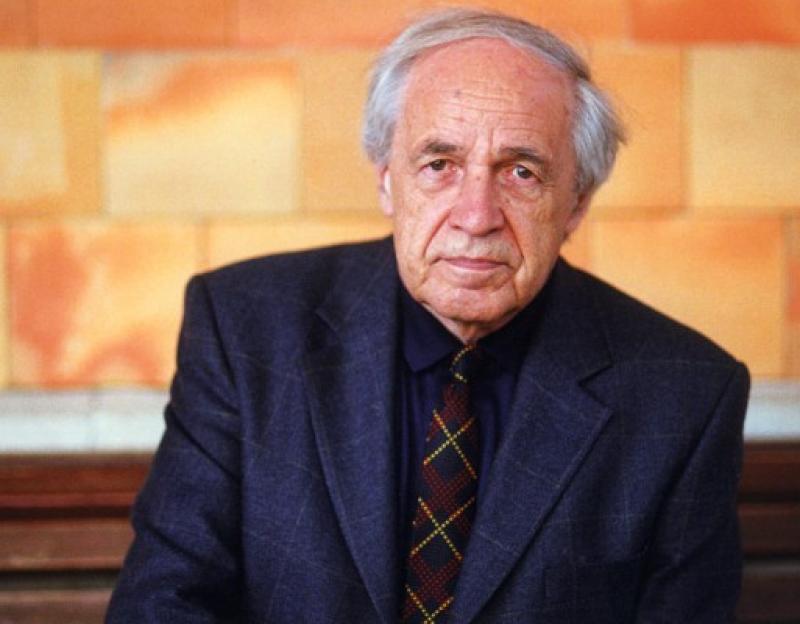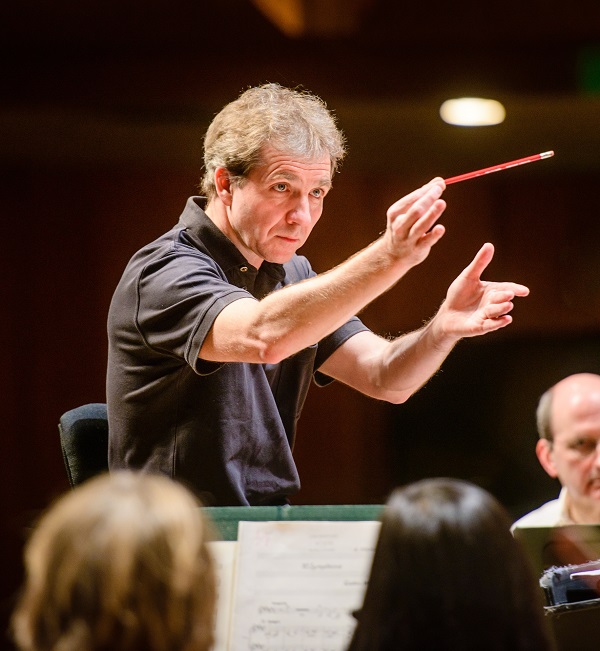Total Immersion: Boulez at 90, Barbican | reviews, news & interviews
Total Immersion: Boulez at 90, Barbican
Total Immersion: Boulez at 90, Barbican
A detailed and engaging portrait of the iconic composer

Pierre Boulez sits in the back of a car as it drives across Westminster Bridge. He is talking about the audience appeal of his music, and he is characteristically direct. If the performance is good, and the situation is right, he insists, then audiences will come. That was back in 1968. The interview was featured in one of the documentaries that began today’s event, and it proved prescient.
The day consisted of two films, one talk and three concerts. There was plenty of dialogue between the individual events, allowing ideas, and even compositions, to carry across. Boulez has a habit of continually revising works, and in two cases we were able catch a piece at different stages of its evolution. Éclats featured in the 1968 documentary, in the form it had reached then, but the concert that followed included it as Éclats/Multiples, the work it finally became in 1970. Similarly, the early evening concert by Guildhall students concluded with Notations, a piano suite of 1945, and the main event began with the orchestral elaboration of the same music, completed in 1997. Fascinating comparisons in both cases, and only available at an event like this.
The lunchtime concert began with a performance of the Second Piano Sonata by Jean-Frédéric Neuburger, a young pianist who lacks the magisterial authority we hear from Pollini in this work, but a more nimble player, able to change mood and colour in an instant. The results were dynamic, dramatic, even impulsive. To conclude the concert, Éclats/Multiples was conducted by the Spaniard Pablo Rus Borseta (standing in for an indisposed François-Xavier Roth). The start felt cautious, but the music quickly established the necessary feeling of ebb and flow. Particularly impressive was Borseta’s use of Boulez’s own hand gestures to articulate the musical paragraphs: the left arm outstretched with the hand pointing directly downwards, switching incisively to an upward position. Concise, unambiguous, and clearly learned from the master himself.
 At LSO St Luke’s, students from the Guildhall School of Music and Drama gave an early evening concert of chamber music. In isolation, the programme seemed diffuse and illogical, but in the context of the day it made perfect sense. Here we had the piano version of Notations, a primer for the evening’s concert. We also had the earliest and most recent compositions of the day, the 1946 Sonatine for Flute and Piano and the 2005 une page d’éphéméride, Boulez’s first work for young performers. In fact, none of the players here needed concessions from the composer on account of their age. The playing was never less than competent, and was often superb. The two flute soloists deserve special mention, Rosie Bowker in Mémoriale (‘…explosante-fixe…’ Originel) and Rebecca Griffiths in the Sonatine, both of whom managed to bring out the lyrical elegance within these knotty scores. One other name to watch: Alexander Soares, whose performance of the piano version of Notations (from memory!) ended this concert on a high.
At LSO St Luke’s, students from the Guildhall School of Music and Drama gave an early evening concert of chamber music. In isolation, the programme seemed diffuse and illogical, but in the context of the day it made perfect sense. Here we had the piano version of Notations, a primer for the evening’s concert. We also had the earliest and most recent compositions of the day, the 1946 Sonatine for Flute and Piano and the 2005 une page d’éphéméride, Boulez’s first work for young performers. In fact, none of the players here needed concessions from the composer on account of their age. The playing was never less than competent, and was often superb. The two flute soloists deserve special mention, Rosie Bowker in Mémoriale (‘…explosante-fixe…’ Originel) and Rebecca Griffiths in the Sonatine, both of whom managed to bring out the lyrical elegance within these knotty scores. One other name to watch: Alexander Soares, whose performance of the piano version of Notations (from memory!) ended this concert on a high.
The evening concert crowned the day, an enlarged BBC Symphony Orchestra giving two major Boulez scores, works that impressively illustrate the composer’s ear for instrumental colour, in ever-innovative mixes and blends. Roth had again been scheduled to conduct, but was this time replaced by compatriot Thierry Fischer (pictured above by Scott Jarvie). A lack of textural focus in some of the slower of the Notations suggested preparations had been rushed, but Fischer compensated in the faster movements, Nos. 4 and 2, providing a strong rhythmic profile for each, the ideal combination of propulsion and detail.
A half-hour interval reset the stage for Pli selon pli, such is the unique stage layout of arguably Boulez’s magnum opus. This performance was more consistent, the textures projected with admirable clarity throughout, at least to the extent that the hall’s acoustic would permit. Some of the longer movements seemed to sag in the passages where ideas unfolded over the course of several minutes, but again Fischer was able to bring the music back into focus in the louder and more rhythmically incisive climaxes. The soprano soloist Yeree Suh was equal to the task but never really shone. Her delivery of Mallarmé’s texts was idiomatic and often highly expressive. But her tuning was insecure, and while she generally projected well, her slender voice was often swallowed up by the huge orchestra.
None of this detracted significantly from what was otherwise an impressive concert and an excellent conclusion to the day. Smart planning ensured that this Total Immersion event gave a rounded and stimulating picture of the composer, but some omissions were regrettable. There was no electronic music, and several major orchestral scores that would have suited the event did not feature. Chances are the orchestra is saving those up for the Proms. The birthday celebrations for Pierre Boulez by his former orchestra may not be over yet, but with the concerts presented today they’ve already done him proud.
rating
Share this article
Add comment
The future of Arts Journalism
You can stop theartsdesk.com closing!
We urgently need financing to survive. Our fundraising drive has thus far raised £49,000 but we need to reach £100,000 or we will be forced to close. Please contribute here: https://gofund.me/c3f6033d
And if you can forward this information to anyone who might assist, we’d be grateful.

Subscribe to theartsdesk.com
Thank you for continuing to read our work on theartsdesk.com. For unlimited access to every article in its entirety, including our archive of more than 15,000 pieces, we're asking for £5 per month or £40 per year. We feel it's a very good deal, and hope you do too.
To take a subscription now simply click here.
And if you're looking for that extra gift for a friend or family member, why not treat them to a theartsdesk.com gift subscription?
more Classical music
 Jansen, LSO, Pappano, Barbican review - profound and bracing emotional workouts
Great soloist, conductor and orchestra take Britten and Shostakovich to the edge
Jansen, LSO, Pappano, Barbican review - profound and bracing emotional workouts
Great soloist, conductor and orchestra take Britten and Shostakovich to the edge
 Jakub Hrůša and Friends in Concert, Royal Opera review - fleshcreep in two uneven halves
Bartók kept short, and a sprawling Dvořák choral ballad done as well as it could be
Jakub Hrůša and Friends in Concert, Royal Opera review - fleshcreep in two uneven halves
Bartók kept short, and a sprawling Dvořák choral ballad done as well as it could be
 Hadelich, BBC Philharmonic, Storgårds, Bridgewater Hall, Manchester review - youth, fate and pain
Prokofiev in the hands of a fine violinist has surely never sounded better
Hadelich, BBC Philharmonic, Storgårds, Bridgewater Hall, Manchester review - youth, fate and pain
Prokofiev in the hands of a fine violinist has surely never sounded better
 Monteverdi Choir, ORR, Heras-Casado, St Martin-in-the-Fields review - flames of joy and sorrow
First-rate soloists, choir and orchestra unite in a blazing Mozart Requiem
Monteverdi Choir, ORR, Heras-Casado, St Martin-in-the-Fields review - flames of joy and sorrow
First-rate soloists, choir and orchestra unite in a blazing Mozart Requiem
 Cho, LSO, Pappano, Barbican review - finely-focused stormy weather
Chameleonic Seong-Jin Cho is a match for the fine-tuning of the LSO’s Chief Conductor
Cho, LSO, Pappano, Barbican review - finely-focused stormy weather
Chameleonic Seong-Jin Cho is a match for the fine-tuning of the LSO’s Chief Conductor
 Classical CDs: Shrouds, silhouettes and superstition
Cello concertos, choral collections and a stunning tribute to a contemporary giant
Classical CDs: Shrouds, silhouettes and superstition
Cello concertos, choral collections and a stunning tribute to a contemporary giant
 Appl, Levickis, Wigmore Hall review - fun to the fore in cabaret and show songs
A relaxed evening of light-hearted fare, with the accordion offering unusual colours
Appl, Levickis, Wigmore Hall review - fun to the fore in cabaret and show songs
A relaxed evening of light-hearted fare, with the accordion offering unusual colours
 Lammermuir Festival 2025, Part 2 review - from the soaringly sublime to the zoologically ridiculous
Bigger than ever, and the quality remains astonishingly high
Lammermuir Festival 2025, Part 2 review - from the soaringly sublime to the zoologically ridiculous
Bigger than ever, and the quality remains astonishingly high
 BBC Proms: Ehnes, Sinfonia of London, Wilson review - aspects of love
Sensuous Ravel, and bittersweet Bernstein, on an amorous evening
BBC Proms: Ehnes, Sinfonia of London, Wilson review - aspects of love
Sensuous Ravel, and bittersweet Bernstein, on an amorous evening
 Presteigne Festival 2025 review - new music is centre stage in the Welsh Marches
Music by 30 living composers, with Eleanor Alberga topping the bill
Presteigne Festival 2025 review - new music is centre stage in the Welsh Marches
Music by 30 living composers, with Eleanor Alberga topping the bill
 Lammermuir Festival 2025 review - music with soul from the heart of East Lothian
Baroque splendour, and chamber-ensemble drama, amid history-haunted lands
Lammermuir Festival 2025 review - music with soul from the heart of East Lothian
Baroque splendour, and chamber-ensemble drama, amid history-haunted lands
 BBC Proms: Steinbacher, RPO, Petrenko / Sternath, BBCSO, Oramo review - double-bill mixed bag
Young pianist shines in Grieg but Bliss’s portentous cantata disappoints
BBC Proms: Steinbacher, RPO, Petrenko / Sternath, BBCSO, Oramo review - double-bill mixed bag
Young pianist shines in Grieg but Bliss’s portentous cantata disappoints

Comments
A great day of concerts.